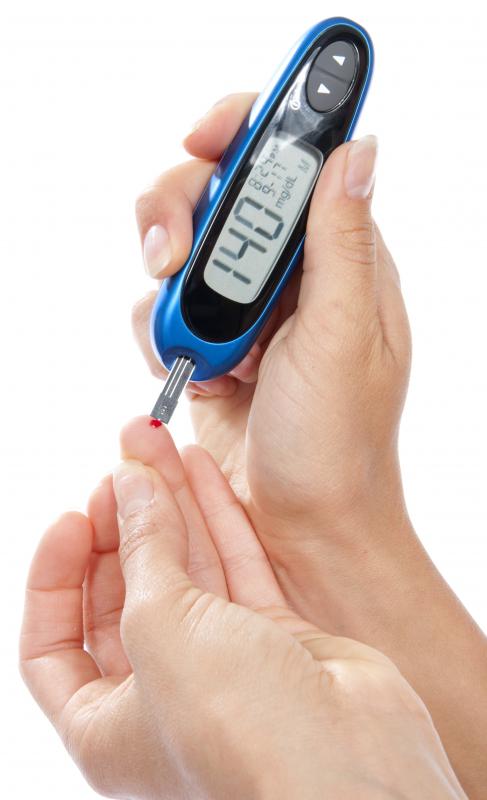At TheHealthBoard, we're committed to delivering accurate, trustworthy information. Our expert-authored content is rigorously fact-checked and sourced from credible authorities. Discover how we uphold the highest standards in providing you with reliable knowledge.
How do I Prevent Hypoglycemia at Night?
Hypoglycemia at night can be prevented by eating an appropriate snack before bedtime. Carefully monitoring your blood glucose levels and consuming a healthy hypoglycemia diet throughout the day may also help prevent the problem. If left untreated, your low blood sugar could cause convulsions, loss of consciousness or other severe health problems.
Nighttime hypoglycemia occurs because your energy needs are lower during sleep, so your liver responds by producing less glucose. Normally, your pancreas would produce less insulin to account for the lower blood glucose levels, but insome people, this does not happen.

You should develop a personalized hypoglycemia diet under the supervision of a professional healthcare provider. In general, you should eat six small meals or three meals with three snacks each day. Problem foods, such as sugar, white flour, alcohol, caffeine and tobacco, should be restricted. Your meals and snacks should include lean meats, whole grains, fresh vegetables and some fruit.

There are many appropriate snacks that can prevent nighttime low blood sugar, and they should contain carbohydrates and protein. A bedtime snack could be a piece of fruit with a handful of nuts, a bowl of oatmeal or a slice of whole grain toast with peanut butter. Dairy products such as yogurt or a glass of milk are healthy options that you can choose. There also are specially manufactured drinks and food bars designed to combat hypoglycemia at night.

Exercise is important in maintaining health, but it can negatively affect your blood sugar levels if not properly planned. Additional exercise during the day can cause hypoglycemia at night. You should eat extra snacks to cover any unplanned or strenuous exercise.
Your insulin medication dosages might need to be adjusted if you routinely experience hypoglycemia at night. If your eat dinner late, a medical professional might prescribe rapid-acting insulin instead of regular insulin. Rapid-acting insulin will begin to lower your blood sugar levels in about five minutes and usually will stop working in about two to four hours. Regular insulin, on the other hand, can continue working for up to six hours. Fast-acting insulin stops working sooner, so you are less likely to have low blood sugar at night.

Knowing your blood sugar levels is crucial in the prevention of nighttime hypoglycemia. Your blood glucose levels should not be lower than 120 milligrams per deciliter (6.6 mmol/L) before bed. If this happens, you might need to eat a larger bedtime snack. You should occasionally check your blood sugar levels at 3 a.m., which is when your body naturally lowers glucose levels to prepare for breakfast.

In addition to nighttime blood glucose monitoring, there are other symptoms that allow you to know whether you are suffering from this problem. Nighttime hypoglycemia often causes profuse sweating that dampens clothing and bedding. Nightmares, restlessness and waking up with a headache are other signs. The classic signs of low blood sugar, such as confusion, dizziness and extreme hunger, can happen during the day or night.
AS FEATURED ON:
AS FEATURED ON:

















Discussion Comments
@JessicaLynn - It's a good think your uncle thought to mention his symptoms to his doctor. If he hadn't, he might still be walking around thinking he had normal blood sugar levels at night when he was suffering from hypoglycemia.
One of my uncles has diabetes, and for awhile he was having hypoglycemia at night. For awhile he couldn't figure out why he was waking up all sweaty, but he eventually talked to his doctor about it and his doctor told him that it was because he didn't have normal blood sugar at night.
My uncle's doctor ended up adjusting his insulin dosage, because just eating a snack before bed wasn't enough to solve the problem.
@betterment - That's great that you can control your low blood sugar problem with your diet. I know a lot of people aren't so lucky. Also, I'm not surprised that limiting sugar helped your blood sugar symptoms. If you're not eating all day long, your blood sugar will be more constant. Sugar causes your blood sugar to rise and then crash.
I get low blood sugar symptoms sometimes. I'm not diabetic, so I'm not on insulin or anything like that. I went to my doctor and he said that for the mean time, I can control my blood sugar with my diet.
He gave me the same recommendation that the article says: to either eat 6 small meals or 3 meals a day with snacks. I chose the three meals a day with snacks option, and I try to time one of those snacks so I eat it right before bed. I also cut down on my sugar a lot, so my blood sugar has been a lot better.
I hope you're not recommending this article for diabetics! If you are, I suggest you read "Diabetes Solution" by Dr. (and T1) Richard K. Bernstein.
Post your comments